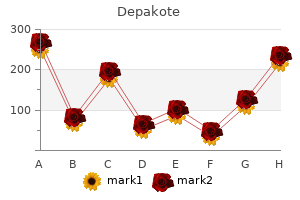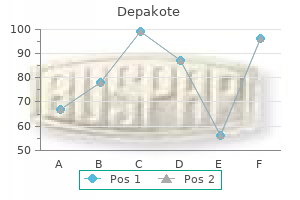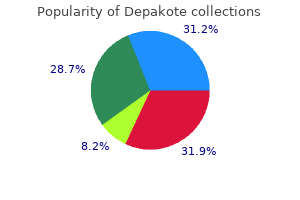Depakote
"Order 250 mg depakote visa, treatment 5th metacarpal fracture."
By: Paul J. Gertler PhD
- Professor, Graduate Program in Health Management

https://publichealth.berkeley.edu/people/paul-gertler/
When midodrine is administered with cardiac glycosides symptoms 3 weeks into pregnancy discount depakote 250mg visa, psychotropic drugs treatment depression order depakote 500mg on line, or blockers, bradycardia, heart block, or arrhythmias can occur. For example, assessment of the patient in shock who is to be treated with norepinephrine is different from that for the patient receiving nose drops containing phenylephrine. Preadministration Assessment When a patient is to receive an adrenergic agent for shock, the nurse obtains the blood pressure, pulse rate and quality, and respiratory rate and rhythm. It is important to look for additional symptoms of shock, such as cool skin, cyanosis, diaphoresis, and a change in the level of consciousness. Other assessments may be necessary if the hypotensive episode is due to trauma, severe infection, or blood loss. In patients taking midodrine for orthostatic hypotension, the nurse checks the blood pressure with the patient supine and sitting before therapy is begun. This is important because midodrine is contraindicated in patients with supine hypertension. When a patient is to have nose drops instilled for nasal congestion, the nurse examines the nasal passages and describes the type of secretions present in the nose. The nurse also should obtain the blood pressure because nose drops that contain adrenergic drugs are not given to those with high blood pressure. Antibiotics, inotropes, hormones (eg, insulin, thyroid), and other drugs may be used to treat the underlying disease. However, the initial pharmacologic intervention is aimed at supporting the circulation with vasopressors. When a patient is in shock and experiencing ineffective tissue perfusion there is a decrease in oxygen resulting in an inability of the body to nourish its cells at the capillary level. If the patient has marked hypotension the administration of a vasopressor (a drug that raises the blood pressure because of its ability to constrict blood vessels) is required. The primary health care provider determines the cause of the hypotension and then selects the best method of treatment. Some hypotensive episodes require the use of a less potent vasopressor, such as metaraminol, whereas at other times a more potent vasopressor, such as dobutamine (Dobutrex), dopamine (Intropin), or norepinephrine (Levophed) is necessary. The nurse considers the following points when administering the potent vasopressors dopamine and norepinephrine: Ongoing Assessment During the ongoing assessment, the nurse observes the patient for the effect of the drug, such as improved breathing of the patient with asthma, response of the blood pressure to the administration of the vasopressor, or controlled orthostatic hypotension. Comparison of assessments made before and after administration may help the primary health care provider determine future use of the drug for this patient. It is important to report adverse drug reactions to the primary health care provider as soon as possible. Monitor blood pressure every 2 minutes from the beginning of therapy until the desired blood pressure is achieved, then monitor the blood pressure and pulse rate at frequent intervals, usually every 5 to 15 minutes, during the administration of these drugs. Inspect the needle site and surrounding tissues at frequent intervals for leakage (extravasation, infiltration) of the solution into the subcutaneous tissues surrounding the needle site. The nurse must exercise great care in the calculation and preparation of these drugs for administration. Although adrenergic drugs are potentially dangerous, proper supervision and management before, during, and after administration will minimize the occurrence of any serious problems. These drugs are particularly damaging to the tissues if leakage into the surrounding tissue occurs. The affected area is infiltrated with 5 to 10 mg of phentolamine in 10 to 15 mL of saline. Nursing Alert Regardless of the actual numerical reading of the blood pressure, a progressive fall of the blood pressure is serious. The urinary output is measured often (usually hourly), and an accurate intake and output is taken. Sometimes additional hemodynamic monitoring is necessary with a pulmonary artery catheter. The use of a pulmonary artery catheter allows the nurse to monitor a number of parameters, such as cardiac output and peripheral vascular resistance. The less potent vasopressors, such as metaraminol, also require close patient supervision during administration. The nurse follows the same procedure as that for norepinephrine and dopamine but may take blood pressure and pulse determinations at less frequent intervals, usually every 15 to 30 minutes.

The most common adverse reactions include light-headedness pure keratin treatment 500 mg depakote visa, dizziness medicine 666 order 250mg depakote with amex, sedation, constipation, anorexia, nausea, vomiting, and sweating. When these effects occur, the primary health care provider may lower the dose in an effort to eliminate or decrease the intensity of the adverse reaction. The obese must be monitored closely for respiratory depression while taking the narcotic analgesics. The drug is used cautiously during lactation (wait at least 4 to 6 hours after taking the drug to breastfeed the infant). The narcotics are used cautiously in patients undergoing biliary surgery because the drug may cause spasm of the sphincter of Oddi. Patients taking the agonist-antagonist narcotic analgesics may experience withdrawal symptoms if the patient has been abusing or using narcotics. The agonist-antagonists drugs can cause opioid withdrawal symptoms in those who are physically dependent on the opioids. Passion flower is often used in combination with other herbs, such a valerian, chamomile, and hops, for promoting relaxation, rest, and sleep. Passion flower contains coumarin, and the risk of bleeding may be increased when used in patients taking warfarin and passion flower. This is especially important when a narcotic is given for the first time because data may be obtained during the initial history and physical assessment that require the nurse to contact the primary health care provider. For example, the patient may state that nausea and vomiting occurred when he or she was given a drug for pain several years ago. Further questioning of the patient is necessary because this information may influence the primary health care provider regarding administration of a specific narcotic drug. Questions to include in the assessment of pain include the following: the nurse may request that the patient evaluate the pain using a standardized pain scale measurement tool. The pain is rated using a scale of 1 to 10, with 10 being the most severe pain and 1 being the least discomfort. Failure to adequately assess pain is a major factor in the undertreatment of pain. It is especially important for the nurse to assess the type, location, and intensity of pain before administering the narcotic analgesic. In addition, a thorough drug history, as well as physical assessment, may raise a question of drug dependency. The nurse must notify the primary health care provider of any suspicion of drug dependency. During the ongoing assessment, it is important for the nurse to ask about the pain regularly and believe the patient and family in their reports of pain. The nurse determines the exact location of the pain, a description of the pain (eg, sharp, dull, or stabbing), and an estimate of when the pain began, each time the patient requests a narcotic analgesic. Further questioning and more detailed information about the pain are necessary if the pain is of a different type than the patient had been experiencing previously or if it is in a different area. Nursing judgment must be exercised because not all instances of a change in pain type, location, or intensity require notifying the primary health care provider. For example, if a patient recovering from recent abdominal surgery experiences pain in the calf of the leg, the nurse should immediately notify the primary health care provider. However, it is not important to contact the primary health care provider for pain that is slightly worse because the patient has been moving in bed. However, the nurse should not deny pain drugs or make the patient wait for the drug. Narcotic analgesics can produce serious or potentially fatal respiratory depression if given too frequently or in an excessive dose. Respiratory depression may occur in patients receiving a normal dose if the patient is vulnerable (ie, in weakened state or debilitated state). Elderly, cachectic, or debilitated patients may have a reduced initial dose until the response of the drug is known. If the respiratory rate is 10/min or below, the nurse must monitor the patient at frequent intervals and notify the primary health care provider immediately. When an opiate is used as an antidiarrheal drug, the nurse records each bowel movement, as well as its appearance, color, and consistency. The nurse should notify the primary health care provider immediately if diarrhea is not relieved or becomes worse; if the patient has severe abdominal pain; or if blood in the stool is noted. Relieving Acute Pain the nurse assesses the patient for relief of pain about 30 minutes after a narcotic analgesic is given.

When given in small doses symptoms 8dpo depakote 250mg free shipping, neuroleptics are effective in the control of acute agitation in the elderly medicine kit discount depakote 500mg otc. More specific uses of these drugs are given in the Summary Drug Table: Antipsychotic Drugs. The adverse reactions seen with the use of some of these drugs may include sedation, hypotension, postural hypotension, dry mouth, nasal congestion, photophobia (an intolerance to light), urticaria, photosensitivity (abnormal response or sensitivity when exposed to light), behavioral changes, and headache. Photosensitivity can result in severe sunburn when patients taking antipsychotic drugs are exposed to the sun or ultraviolet light. These changes include an increase in the intensity of the psychotic symptoms, lethargy, hyperactivity, paranoid reactions, agitation, and confusion. Extrapyramidal Effects Among the most significant adverse reactions associated with the antipsychotic drugs are the extrapyramidal effects. The term extrapyramidal effects refers to a group of adverse reactions occurring on the extrapyramidal portion of the nervous system as a result of antipsychotic drugs. This part of the nervous system affects body posture and promotes smooth and uninterrupted movement of various muscle groups. Antipsychotics disturb the function of the extrapyramidal portion of the nervous system, causing abnormal muscle movement. Extrapyramidal effects usually diminish with a reduction in the dosage of the antipsychotic drug. The primary health care provider may also prescribe an antiparkinsonism drug, such as benztropine (see Chap. It is best to use the smallest dose and the shortest duration of treatment that produces a satisfactory clinical response. The syndrome most often occurs in patients taking haloperidol, but has occurred with administration of thiothixene, thioridazine, and clozapine. The tongue may protrude, and there may be chewing movements, puckering of the mouth, and facial grimacing. Depending on the severity of the condition being treated, the primary health care provider may slowly taper the drug dose because abrupt discontinuation may result in a return of the psychotic symptoms. The most common adverse reactions include tremors, nausea, vomiting, thirst, and polyuria. Because some of these toxic reactions are potentially serious, lithium blood levels are usually obtained during therapy, and the dosage of lithium is adjusted according to the results. After observing the patient, he/she may be rated on a scale of 0 (none), 1 (minimal), 2 (mild), 3 (moderate), and 4 (severe) according to the severity of symptoms. If yes, ask to describe and to what extent they currently bother patient or interfere with his/her activities. Date 0 1 2 3 4 Have patient sit in chair with hands on knees, legs slightly apart, and feet flat on floor. A simple method to determine tardive dyskinesia symptoms: Abnormal Involuntary Scale* examination procedure. Antipsychotic drugs are classified as Pregnancy Category C drugs (except for clozapine, which is Pregnancy Category B). Safe use of these drugs during pregnancy and lactation has not been clearly established. They should be used only when clearly needed and when the potential good outweighs any potential harm to the fetus. Lithium is contraindicated in patients who have hypersensitivity to tartrazine, renal or cardiovascular disease, sodium depletion, dehydration, patients receiving diuretics, and those who are dehydrated. Lithium is a Pregnancy Category D drug and is contraindicated during pregnancy and lactation. For women of childbearing age, contraceptives may be prescribed while they are taking lithium. The antipsychotic drugs are used cautiously in elderly and debilitated patients because these patients are more sensitive to the antipsychotic drugs. Lithium is used cautiously in patients who are in situations in which they may sweat profusely and those who are suicidal, have diarrhea, or who have an infection or fever. Clozapine acts synergistically with other drugs that suppress bone marrow, resulting in an increase in the severity of bone marrow suppression. When lithium is administered with other antipsychotic drugs, lithium renal clearance may be reduced, making a decreased dosage necessary to prevent lithium toxicity. There may be a decreased effectiveness of lithium when the agent is administered with antacids.

These drugs are contraindicated in patients with known hypersensitivity to the drug or to any constituents of the drug 714x treatment for cancer best 500mg depakote, after a recent myocardial infarction (heart attack) medications heart failure buy depakote 250 mg visa, or in patients with thyrotoxicosis. When hypothyroidism is a cause or contributing factor to a myocardial infarction or heart disease, the physician may prescribe small doses of thyroid hormone. The thyroid hormones are classified as Pregnancy Category A and are considered safe to use during pregnancy. When administered with cholestyramine or colestipol there is a decreased absorption of the oral thyroid preparations. These drugs should not be administered within 4 of 6 hours of the thyroid hormones. When administered with the oral anticoagulants there is an increased risk of bleeding. It may be advantageous to decrease the dosage of the anticoagulant when a thyroid preparation is prescribed. There is a decreased effectiveness of the digitalis preparation if taken with a thyroid preparation. Levothyroxine (Synthroid) also can be given intravenously and is prepared for administration immediately before use. At times, several upward or downward dosage adjustments must be made until the optimal therapeutic dosage is reached and the patient becomes euthyroid. Some patients may exhibit anxiety related to the symptoms of their disorder, as well as concern about relief of their symptoms. The patient should be reassured that although relief may not be immediate, symptoms should begin to decrease or even disappear in a few weeks. Monitoring and Managing Adverse Reactions the nurse monitors the patient for any adverse reactions, especially during the initial stages of dosage adjustment. The nurse notifies the primary health care provider if the patient experiences these or any adverse drug reactions. If the dosage is inadequate the patient will continue to experience signs of hypothyroidism (see Table 51-1). The nurse performs a general physical assessment to determine outward signs of hypothyroidism. Gerontologic Alert the symptoms of hypothyroidism may be confused with symptoms associated with aging, such as depression, cold intolerance, weight gain, confusion, or unsteady gait. The presence of these symptoms should be thoroughly evaluated and documented in the preadministration assessment and periodically throughout therapy. Ongoing Assessment the full effects of thyroid hormone replacement therapy may not be apparent for several weeks or more, but early effects may be apparent in as little as 48 hours. During the ongoing assessment, the nurse monitors the vital signs daily or as ordered and observes the patient for signs of hyperthyroidism, which is a sign of excessive drug dosage. Signs of a therapeutic response include weight loss, mild diuresis, a sense of well-being, increased appetite, an increased pulse rate, an increase in mental activity, and decreased puffiness of the face, hands, and feet. Nursing Alert If signs of hyperthyroidism (eg, nervousness, anxiety, increased appetite, elevated body temperature, tachycardia, moderate hypertension or flushed, warm, moist skin) are apparent, the nurse reports these to the primary health care provider before the next dose is due because it may be necessary to decrease the daily dosage. Nursing Diagnoses Checklist Decreased Cardiac output related to adverse reactions Anxiety related to symptoms, adverse reactions, treatment regimen, other (specify) Thyroid hormone replacement therapy in patients with diabetes may increase the intensity of the symptoms or the diabetes. The nurse closely monitors the patient with diabetes during thyroid hormone replacement therapy for signs of hyperglycemia (see Chap. The nurse carefully observes patients with cardiovascular disease taking the thyroid hormones. The development of chest pain or worsening of cardiovascular disease should be reported to the primary health care provider immediately because the patient may require a reduction in the dosage of the thyroid hormone. In addition, the elderly are at increased risk for adverse cardiovascular reactions when taking thyroid drugs. The initial dosage is smaller for an older adult, and increases, if necessary, are made in smaller increments during a period of about 8 weeks. If the pulse rate is 100 bpm or more, the nurse notifies the primary health care provider before the drug is administered. In addition to the antithyroid drugs, hyperthyroidism may be treated by the administration of strong iodine solutions, use of radioactive iodine (131I), or by surgical removal of some or almost all of the thyroid gland (subtotal thyroidectomy). Educating the Patient and Family Thyroid hormones are usually given on an outpatient basis. The nurse emphasizes the importance of taking the drug exactly as directed and not stopping the drug even though symptoms have improved.
Cheap depakote 500mg with amex. Symptoms of migraine.
References:
- https://www.usbr.gov/lc/phoenix/programs/cass/pdf/Phase1/ATechapdxTDS.pdf
- https://files.eric.ed.gov/fulltext/ED500181.pdf
- https://www.ctsi.ucla.edu/education/files/view/training/docs/CarmichaelJC.pdf
